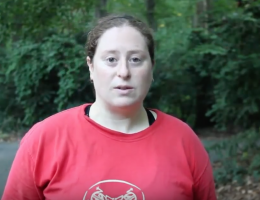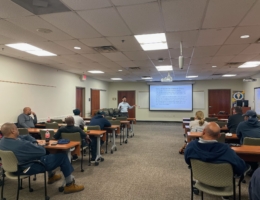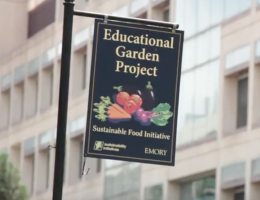Curriculum Highlights
Integrating sustainability into the academic realm has been a priority for Emory for years, and with a legacy of institutional sustainability leadership and ambitious goals for the future, we provide every student the opportunity to explore sustainable topics in the classroom and to become a part of solution-making through experiential learning and campus engagement.
In 2024, 17.7% of all Emory courses are sustainability-focused or sustainability-inclusive.
With numerous engaging opportunities to delve into sustainability-related topics, Emory’s campus is truly a living laboratory which develops both students’ and faculty members’ abilities to connect sustainability to their primary disciplines and fosters a dynamic, sustainability-oriented learning community.
Curriculum Benefits
- With courses in several departments creating opportunities for creative research and projects, Emory’s campus becomes a living laboratory for student learning in sustainability. Students engage in applied research, connecting knowledge gained in the classroom to actively advancing sustainability on campus.
- Emory’s diverse offerings of sustainability learning opportunities train students to become versatile leaders in environmental action. Sustainability courses prepare students for the working world, where interdisciplinary thought and action are often required. At least one of these numerous offerings is sure to meet any student’s unique interests, no matter their primary discipline.
- Students can enroll in one of the sustainability-related and -focused courses offered in their school: “Foundations of Sustainability,” the “Sustainable Food Fair” planning course, “Business & Society,” “Environmental Law,” “Global Environmental Health Policy,” and many more.
How It Works
- Undergraduate students can earn an interdisciplinary Sustainability Minor and a Sustainability Sciences Minor through the Department of Environmental Sciences, or concentrate in Environmental Management through the Goizueta Business School.
- Undergraduates can strengthen leadership skills while creating sustainable community change with the Ethics and Servant Leadership Program and the Community Building and Social Change Minor.
- Emory offers sustainability-focused programs for graduate-level students such as the Master’s in Development Practice at the Laney Graduate School and the Master’s of Public Health in Environmental Health and Certificate in Climate and Health at the Rollins School of Public Health.
- The Turner Environmental Law Clinic and the Environmental and Natural Resources Law Program train Emory Law students to become sustainability leaders in environmental law.
- Graduate students can apply for the Piedmont TATTO Fellowship on Sustainability and Curriculum Development to expand their teaching repertoire around sustainability and related issues. Find more detailed information here.
- Faculty members can apply for the Piedmont Project, an interdisciplinary summer development program which has given scores of faculty members and administrators the tools, connections and inspiration to infuse sustainability and environmental issues into the classroom and beyond. Visit the Project’s official website here.






